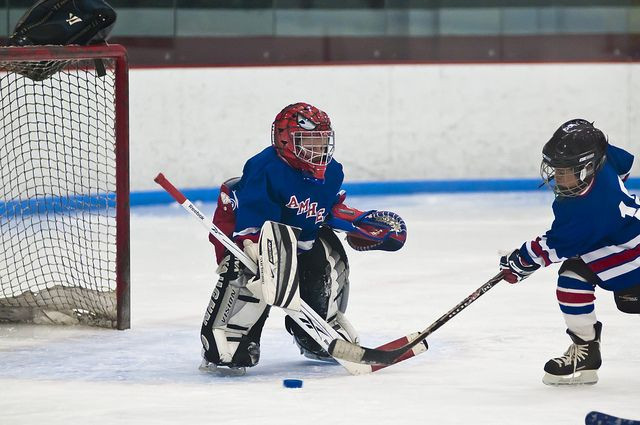Symptoms Of Concussion Last 21 Days Longer In Teen Hockey Players Who Are Physically Less Mature

Male ice hockey players who are less physically mature have a higher risk of prolonged symptoms from concussion, a new Hasbro Children's Hospital study suggests. On average, the less mature players took 21 days longer to recover — nearly 40 percent longer — compared to their more mature peers, researchers say.
Previously called a "contact sport," the American Academy of Pediatrics now categorizes hockey as a "collision sport." Terminology aside, just ask any mom: Hockey can be dangerous. Two out of every 100 players between the ages 12 and 17 suffer injuries requiring a visit to the ER, according to USA Hockey Magazine. And, among young ice hockey players, concussion is the most common injury, according to the authors of the current report. It represents more than 15 percent of all injuries for 9- to 16-year-olds and nearly a quarter of all injuries for male high school players.
Led by Dr. Peter Kriz, a sports medicine physician, a research team further investigated the links between physical maturity and risk of prolonged concussion symptoms in teen ice hockey players. They evaluated 145 ice hockey players between the ages of 13 and 18 who were treated for concussion at three New England hospitals: Hasbro Children's Hospital, Boston Children's Hospital, and South Shore Hospital. Along with symptoms of concussion, the researchers assessed disparities in age, size, and physical maturity level. The study ran from Sept. 1, 2012 through March 31, 2015.
Primarily, the researchers were looking for duration of concussion symptoms. Their evaluations relied on neurologic examination, neurocognitive testing, and the standardized Post Concussive Symptom Score. Importantly, the team measured each teen's physical maturity not by age but by using the traditional Pubertal Developmental Scale.
After analyzing all their data, Kriz and his colleagues discovered maturity level and weight mattered a lot when it came to concussion.
Playing Up
Results indicated about half of all players had prolonged concussion symptoms, which was 28 days or longer. Most (about 87 percent) had symptom resolution within three months (90 days), though the average duration of concussion symptoms was 44.5 to 48.7 days.
For male teens, those who were less physically mature took longer to recover than those who were more physically mature — 54.5 days versus 33.4 days. In fact, a Pubertal Category Score of “early” was the strongest predictor of prolonged symptoms among males.
For female teens, heavier weight increased the odds of experiencing prolonged symptoms.
Because of equipment costs, hockey players are not always stratified by age, and so younger, less physically mature players often oppose older players with increased strength, power, and speed, the authors explained. Younger players are at a distinct disadvantage and therefore more likely to get hurt.
Importantly, despite their actual ages, 65 percent of the freshman male ice hockey players were in the early stages of pubertal development.
The authors concluded teen athletes who play collision sports should compete in leagues grouped by relative age and also be discouraged from “playing up” on varsity teams. Typical symptoms of a concussion, according to the Mayo Clinic, include headache, temporary loss of consciousness, confusion, dizziness, nausea, vomiting, slurred speech, and fatigue. Any athlete who is still experiencing symptoms should not participate in sports.
Source: Kriz PK, Stein C, Kent J, et al. Physical Maturity and Concussion Symptom Duration among Adolescent Ice Hockey Players. The Journal of Pediatrics. 2016.
Published by Medicaldaily.com



























